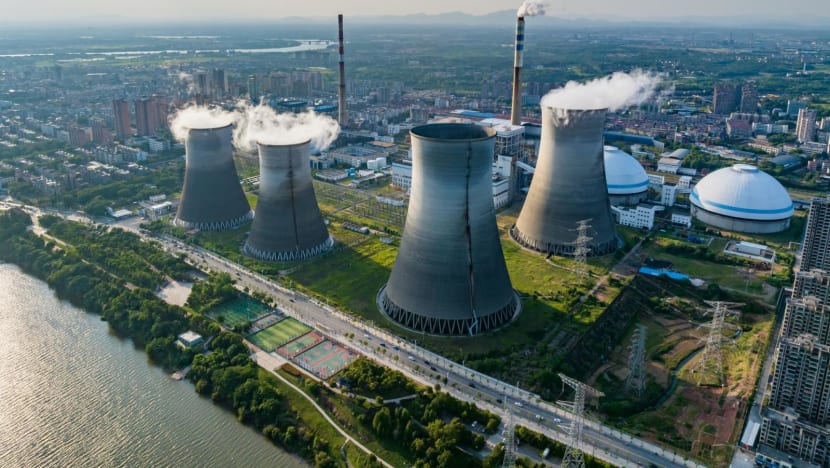Singapore aims to build pool of about 100 nuclear energy experts
Singapore has not made any decision on the deployment of nuclear energy and is unable to commit to a timeline on taking a position regarding it, says Second Minister for Trade and Industry Dr Tan See Leng.

File photo of nuclear power plants. (Photo: iStock/Ke Zhuang)

This audio is generated by an AI tool.
SINGAPORE: Singapore has plans to build a pool of about 100 nuclear energy experts in the medium to long run, said Second Minister for Trade and Industry Tan See Leng on Wednesday (Apr 3). However, no decision has been made on the deployment of nuclear energy and Singapore is unable to commit to a timeline on taking a position regarding it.
Dr Tan was responding to supplementary questions posed by Member of Parliament Gerald Giam (WP-Aljunied) who asked how many scientists are currently at the Singapore Nuclear Research and Safety Initiative, as well as the number of scholarships awarded each year to help build a pipeline of nuclear scientists and expertise.
Mr Giam also asked if the government is building up the necessary regulatory policy frameworks that will be needed to oversee potential nuclear energy programmes such as nuclear fission and nuclear fusion.
To this, Dr Tan said the government supports efforts to train scientists and experts in local and overseas universities.
Over the last decade, the Singapore Nuclear Research and Safety Initiative at the National University of Singapore (NUS) has awarded 30 scholarships for postgraduate studies in areas related to nuclear science and engineering. It has also developed a pipeline of around 40 researchers specialising in radiobiology, radiochemistry and nuclear safety.
“We aim to build up a pool of about 100 experts in the medium to long run,” Dr Tan said.
On nuclear fusion, the minister acknowledged that there is “a lot of excitement” in the fusion space. “To date, on a sustainable basis, the net energy input needed to create that nuclear fusion reaction far exceeds the output of the energy that we can harness,” he added.
The closest system many countries have developed is based on tokamak, which is an experimental device to create a nuclear fusion reaction. This in turn produces energy to heat water and produce steam that drives turbines to generate electricity.
But the technology is still in the development stage and the actual project has not come to fruition yet, said Dr Tan. He added that researchers from Singapore also have been sent to the United States to study how the technology will evolve.
“For nuclear fusion, to answer the question, I think it's still quite nascent, and we are probably at least a decade away.”
Nonetheless, the government is watching the space very closely and “nothing is off the table”, added Dr Tan.
“We continue to keep our options open to all kinds of low carbon energy, including, of course, nuclear energy, both fission and fusion.”
The Government has not made any decisions regarding the deployment of nuclear energy in Singapore and as such, it has no plans for uranium stockpiling. Second Minister for Trade and Industry Tan See Leng said this in Parliament on Wednesday (Apr 3). He was replying to an MP’s question on whether Singapore has plans to stockpile uranium to secure energy sources ahead of other countries shifting towards nuclear energy, and what it is doing to prepare a core of local talent for the industry. Dr Tan said any deployment decision will require detailed studies of the safety, reliability, affordability and environmental sustainability of nuclear energy in the local context. So, what the Government is doing is steadily building capabilities to better understand and assess global developments on advanced nuclear energy technologies. It aims to build a pool of about 100 experts in the field, in the medium to long run, said Dr Tan.
"NOT ABLE TO COMMIT TO A PARTICULAR TIMELINE"
Mr Giam also asked Dr Tan when is the government going to take a position on whether to use nuclear energy as part of Singapore’s energy mix in the future. “Does the minister agree that it's important to provide some certainty or more certainty to both aspiring scientists and our people with regard to the use of nuclear energy?” he said.
In response, Dr Tan said: “I think that the member presupposes that we made a decision on nuclear energy.”
Reiterating that the government has not made a decision, Dr Tan said that Singapore has to wait for a small modular reactor or the newer generation of thermal reactors to be deployed commercially, and understand the safety profile before making a decision.
This is because the safety buffer zone for conventional nuclear generators like the first and second generations is beyond Singapore's radius.
At the same time, the government also recognises that radiological safety, the understanding of the operational capabilities and the engineering science behind it continue to be something that is “important and relevant” to Singapore, he added.
Dr Tan pointed out that local talent continue to be trained, and are sent overseas and attached to institutions to learn, adapt to the expertise and absorb the knowledge.
“(This is) so that at some point in time when we have finally made a decision, we will then bring them back here,” he said.
“I think this as far as we can tell you. We will not be able to commit to a particular timeline. But that doesn't mean that we stop looking at it.”
Earlier during parliament on Wednesday, Mr Giam had posed questions on Singapore's plans to stockpile uranium to secure energy sources ahead of other countries shifting towards nuclear energy, as well as what is being done to prepare a core of local talent to enter this industry.
In his reply to the parliamentary questions, Dr Tan said that Singapore has no plans for uranium stockpiling. Any deployment decision will require detailed studies of the safety, reliability, affordability, and environmental sustainability of nuclear energy in the local context, he added.
“We are therefore steadily building capabilities to better understand and assess global developments on advanced nuclear energy technologies.”
















